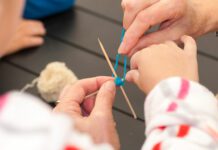The Lego Company began in the workshop of Ole Kirk Christiansen, a carpenter from Billund, Denmark, who began making wooden toys in 1932. In 1934, his company came to be called “Lego.” The word Lego comes from a Danish phrase which means “play well.” In 1947, Lego expanded and began producing plastic toys.
What started in a carpenter’s small workshop has grown into a global enterprise that is now the world’s largest manufacturers of toys.
At the center of Lego’s success is the Lego brick. It has been named the “Toy of the Century” twice. In a day when many traditional toy companies struggle to compete with digital toys such as video games, the Lego brick remains a constant best-seller.
What makes Legos so appealing to kids? If you look closer, there are some huge lessons children’s ministries can learn from the success of Lego. Here are four of them.
Lesson #1 – Keep it simple.
Lego makes plastic, brightly colored blocks. They focus their efforts on these simple bricks and do it with excellence. They have not had a safety recall in over five years. Each brick contains a numerical code that can be traced if there are any issues. Their focus allows them have a high level of efficiency and precision.
Takeaways for children’s ministries:
- Focus on doing a few things with excellence.
- Constantly evaluate and track what is most effective.
- Pour your time, energy and resources into what you are focusing on.
Lesson #2 – Find out what kids like.
A big secret behind Lego’s success is their commitment to studying how kids like to play. Lego is the largest private sponsor of play research in the world. They go beyond focus groups and study kids playing in real life. They have even gone as in-depth as watching kids’ brains at play under an MRI.
In their research, they noticed that kids were the most engaged in sustained play when they were focusing on mastering a skill and making something. Lego has used this research to build a deep understanding of what is fun for kids. They understand what’s important to kids and how to create experiences that are deeply meaningful to them.
Takeaways for children’s ministries:
- Watch kids during your services, classes, programs and events. Make a note of what they respond to well.
- Be willing to change and tweak what you are doing as you watch how kids respond.
- Our goal should be to engage kids with God’s Word. Information without engagement will fall flat.
Lesson #3 – Stay current with the culture.
Notice how Lego packages their bricks based on what is going on in the culture. If Star Wars is popular in the culture, Lego will create Lego Star Wars kits. If superheroes are popular in the culture, Lego will create Lego superhero kits. If Disney Princess is popular in the culture, Lego will create Lego Princess kits. The foundation, the basic shapes of the Lego, stays the same, but how it is packaged changes to stay current with the culture.
Takeaways for children’s ministries:
- Stay current with kid culture.
- Our foundation, the Bible, doesn’t change, but how we package it must change so kids can connect with it.
- Relevance is not an option. It is a necessity.
Lesson #4 – Involve parents.
Lego is the only toy company in the world that claims to capture the interests of both kids and parents. Parents see their kids concentrating, making things and learning. Kids enjoy building, creating and mastering. It’s a win for both kids and parents. It is also a toy that gives kids and parents the opportunity to build things together and have a shared experience.
Takeaways for children’s ministries:
- Show parents the value of what their children are learning and experiencing in your ministry.
- Provide opportunities for kids and parents to have shared experiences.
- Extend what is happening at church into the home.
Praying for you and your ministry as you help kids and parents “build” a strong faith foundation!
This article originally appeared here.












